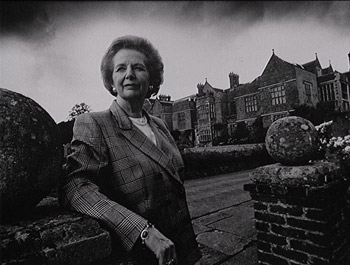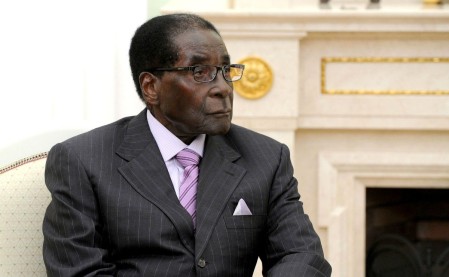 Margaret Thatcher at Chequers in 1993
The response to the death of Mrs Thatcher has provoked many reactions. There is much nostalgia in some of these recollections, whether invoked by her imperial adventures in the South Atlantic or stoic opposition to European bureaucrats, and inevitably complex questions have been reduced to simple messages.
Margaret Thatcher at Chequers in 1993
The response to the death of Mrs Thatcher has provoked many reactions. There is much nostalgia in some of these recollections, whether invoked by her imperial adventures in the South Atlantic or stoic opposition to European bureaucrats, and inevitably complex questions have been reduced to simple messages.
However, historical memory itself is a politically contested area and this has been made very clear in Thatcher’s case. Gushing tributes from Tory and New Labour politicians have been accompanied by street parties in Glasgow, Liverpool and Brixton.
How we remember Thatcher and Thatcherism will have a bearing on contemporary politics.
There has been much respect across the political spectrum, for her as a ‘conviction’ politician. This is partly a reflection on the limitations of the modern politician, now constrained more than ever by soundbites and spindoctors, and who operate in a less ideologically polarised age.
But Thatcher – and in particular Thatcherism – has a much more profound meaning. That there is an ‘ism’ implies a set of distinctive ideas and beliefs, a critique of the world as it exists and a vision of how things need to change. For example, few talk of ‘Blairism’; and if they do, they normally refer to questions of style and presentation.
This ideological nature of Thatcherism helps us understand wider changes in Britain in recent decades and shifts which have taken place across politics, economics and culture. Much of the pioneering thinking on Thatcherism can be found in the work of Stuart Hall. His first article The Great Moving Right Show, written before Thatcher came to power and while Hall was still at the Centre for Contemporary Cultural Studies, was a prescient analysis of the ‘swing to the right’ that was taking place in British society.
In this article, Hall outlined the way in which Thatcher and the radical right had put together a critique of the post-war social democratic consensus and were attempting to construct a new consensus drawn from some of the ‘common sense’ hopes and fears of ordinary people and based around the idea of a free market and a strong state. He called this drift to the right; ‘authoritarian populism’
Hall’s analysis was informed by the ideas of the Italian Marxist Antonio Gramsci. This included the importance Gramsci attributed to periods of ‘organic crisis’, where the existing ideological framework and assumptions, political settlements and economic rationale, no longer convinced and were brought into question.
According to Gramsci, organic crises, which ‘may last for decades’, were moments in politics when the ‘old is dying but the new is still to be born’. According to Hall, Britain from the mid-1970s onwards was in such a crisis. Thatcher understood this and in particular that the Keynesian-social democratic consensus was breaking down and that in order to take full advantage of this the Conservative Party also had to change to embrace free market economic ideas and more authoritarian social policies.
In further articles in Marxism Today and elsewhere, Hall, who joined The Open University as Professor of Sociology the same year Mrs Thatcher took office, applied another Gramscian concept: hegemony. Thatcherism, he argued, was a ‘hegemonic’ project which had won an ideological battle and was in the process of constructing a new consensus. He also argued that the left had failed to understand the nature of the crisis and had no alternative.
In making this case, Thatcherite ideology drew on the work of Milton Friedman and applied his free market thinking to the specific situation in Britain. This kind of individualism represented a ‘qualitative’ shift in the political agenda of the Conservative Party, now defined as the ‘radical right’.
In this way Thatcher, supported by several New Right think tanks, including the Institute of Economic Affairs, the Centre for Policy Studies and the Adam Smith Institute, was able to claim that Labour’s welfare and social agenda was denying freedom to individuals, encouraging ‘dependency’ and, combined with trade union power, was responsible for Britain’s economic ruin.
They argued that Keynesianism, which had partly informed Conservative as well as Labour governments in the past, had failed and needed to be replaced by Monetarist thinking. Large-scale privatisation of what classical conservatives regarded as the ‘family silver’ was to follow.
When remembering Thatcherism it is important to consider the wide cultural impact, and not only the introduction of market ideas into areas of life that were previously regarded as safe from laissez-faire principles.
It stimulated a major response in drama, literature and music and some of the most innovative critics of Thatcherism were artists of various kinds. Thatcherism, almost uniquely, encouraged its own genres in response, whether in the dramas of Alan Bleasdale, the films of Mike Leigh or the music of Billy Bragg. In recent days, suggestions of a Thatcher soundtrack have even been proposed.
Thatcherism’s legacy has lived on in many ways. New Labour politicians have openly acknowledged their debts to Thatcherite thinking on the economy and trade union reforms. With the current political situation in mind, critics have also pointed out the close parallels between the languages of welfare and poverty in the 1980s and current government agendas.
Thatcherism has left its ‘ideological’ mark also on higher education. In the early 1980s, Education Minister Keith Joseph, together with some of his officials in the Department of Education, reportedly went through some Open University courses in search of Marxist bias.
Hopefully they found something to stimulate their interest. The Higher Education agenda, with its current focus on ‘employability’ and ‘customers’, could be one area, at least, where Thatcherism can be said to have won – for now anyway.





Rate and Review
Rate this article
Review this article
Log into OpenLearn to leave reviews and join in the conversation.
Article reviews
However her portarayal as a truthful politician was somewhat marred by the biography that Charles Moore wrote in 2015. Citing the Westland Helicopter crisis were there were two contracts waitiing
to take over Westland ,Thatcher backed the American company Sikorski and Heseltine backed
an Italian company . Heseltine sent a letter to the head of British Aerospace saying he backed
the Italian company. The letter was sent from the despatch office of the Department of Trade
and Industry. It was immediately leaked to the press. Colette Beau was the press officer at the
time and said she was obeying orders. Margaret Thatcher stood up in Parliament a few days
later and said she had no knowledge of the letter and was not near the office at the time.
The letter caused the resignation of Michael Heseltine from the cabinet. In his book Moore
interviewed Colette Beau in 2015 . Beau said that Margaret Thatcher manufactured the
whole incident. Another feature of Thatcher's government was the selling off of council
houses to tenants. at lower than the market rate. Once these properties were sold off
the councils were supposed to build new houses which never happened even under
labour government in the 1990's. This of course led to the current housing crisis
with the rented sector approximating at just under 50% of the population.